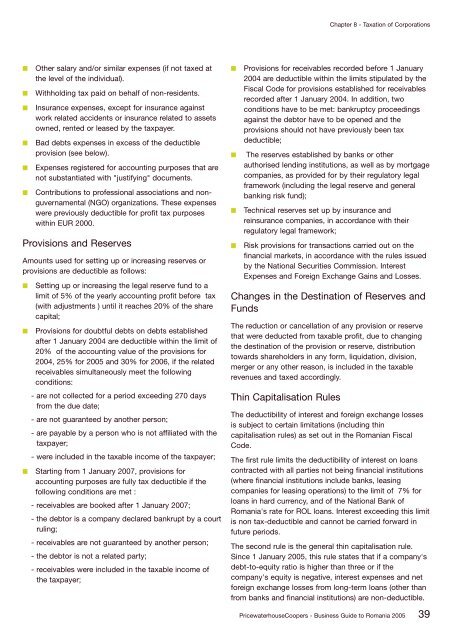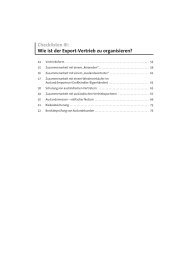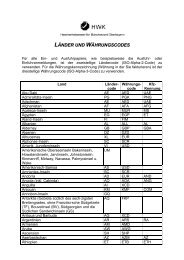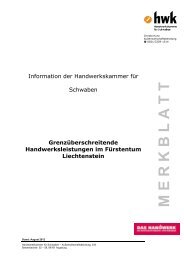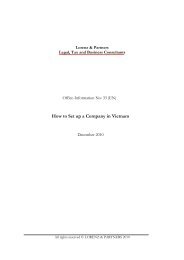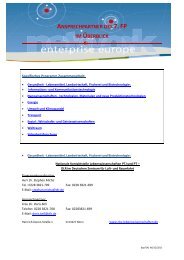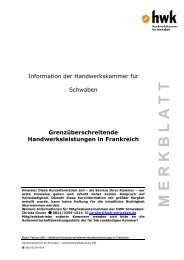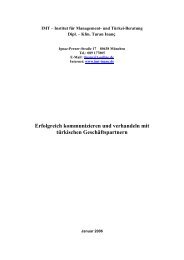Business Guide to Romania* - Bayern - Europa
Business Guide to Romania* - Bayern - Europa
Business Guide to Romania* - Bayern - Europa
Create successful ePaper yourself
Turn your PDF publications into a flip-book with our unique Google optimized e-Paper software.
■ Other salary and/or similar expenses (if not taxed at<br />
the level of the individual).<br />
■ Withholding tax paid on behalf of non-residents.<br />
■ Insurance expenses, except for insurance against<br />
work related accidents or insurance related <strong>to</strong> assets<br />
owned, rented or leased by the taxpayer.<br />
■ Bad debts expenses in excess of the deductible<br />
provision (see below).<br />
■ Expenses registered for accounting purposes that are<br />
not substantiated with "justifying" documents.<br />
■ Contributions <strong>to</strong> professional associations and nonguvernamental<br />
(NGO) organizations. These expenses<br />
were previously deductible for profit tax purposes<br />
within EUR 2000.<br />
Provisions and Reserves<br />
Amounts used for setting up or increasing reserves or<br />
provisions are deductible as follows:<br />
■ Setting up or increasing the legal reserve fund <strong>to</strong> a<br />
limit of 5% of the yearly accounting profit before tax<br />
(with adjustments ) until it reaches 20% of the share<br />
capital;<br />
■ Provisions for doubtful debts on debts established<br />
after 1 January 2004 are deductible within the limit of<br />
20% of the accounting value of the provisions for<br />
2004, 25% for 2005 and 30% for 2006, if the related<br />
receivables simultaneously meet the following<br />
conditions:<br />
- are not collected for a period exceeding 270 days<br />
from the due date;<br />
- are not guaranteed by another person;<br />
- are payable by a person who is not affiliated with the<br />
taxpayer;<br />
- were included in the taxable income of the taxpayer;<br />
■ Starting from 1 January 2007, provisions for<br />
accounting purposes are fully tax deductible if the<br />
following conditions are met :<br />
- receivables are booked after 1 January 2007;<br />
- the deb<strong>to</strong>r is a company declared bankrupt by a court<br />
ruling;<br />
- receivables are not guaranteed by another person;<br />
- the deb<strong>to</strong>r is not a related party;<br />
- receivables were included in the taxable income of<br />
the taxpayer;<br />
■ Provisions for receivables recorded before 1 January<br />
2004 are deductible within the limits stipulated by the<br />
Fiscal Code for provisions established for receivables<br />
recorded after 1 January 2004. In addition, two<br />
conditions have <strong>to</strong> be met: bankruptcy proceedings<br />
against the deb<strong>to</strong>r have <strong>to</strong> be opened and the<br />
provisions should not have previously been tax<br />
deductible;<br />
■ The reserves established by banks or other<br />
authorised lending institutions, as well as by mortgage<br />
companies, as provided for by their regula<strong>to</strong>ry legal<br />
framework (including the legal reserve and general<br />
banking risk fund);<br />
■ Technical reserves set up by insurance and<br />
reinsurance companies, in accordance with their<br />
regula<strong>to</strong>ry legal framework;<br />
■ Risk provisions for transactions carried out on the<br />
financial markets, in accordance with the rules issued<br />
by the National Securities Commission. Interest<br />
Expenses and Foreign Exchange Gains and Losses.<br />
Changes in the Destination of Reserves and<br />
Funds<br />
The reduction or cancellation of any provision or reserve<br />
that were deducted from taxable profit, due <strong>to</strong> changing<br />
the destination of the provision or reserve, distribution<br />
<strong>to</strong>wards shareholders in any form, liquidation, division,<br />
merger or any other reason, is included in the taxable<br />
revenues and taxed accordingly.<br />
Thin Capitalisation Rules<br />
Chapter 8 - Taxation of Corporations<br />
The deductibility of interest and foreign exchange losses<br />
is subject <strong>to</strong> certain limitations (including thin<br />
capitalisation rules) as set out in the Romanian Fiscal<br />
Code.<br />
The first rule limits the deductibility of interest on loans<br />
contracted with all parties not being financial institutions<br />
(where financial institutions include banks, leasing<br />
companies for leasing operations) <strong>to</strong> the limit of 7% for<br />
loans in hard currency, and of the National Bank of<br />
Romania's rate for ROL loans. Interest exceeding this limit<br />
is non tax-deductible and cannot be carried forward in<br />
future periods.<br />
The second rule is the general thin capitalisation rule.<br />
Since 1 January 2005, this rule states that if a company's<br />
debt-<strong>to</strong>-equity ratio is higher than three or if the<br />
company's equity is negative, interest expenses and net<br />
foreign exchange losses from long-term loans (other than<br />
from banks and financial institutions) are non-deductible.<br />
PricewaterhouseCoopers - <strong>Business</strong> <strong>Guide</strong> <strong>to</strong> Romania 2005 39


